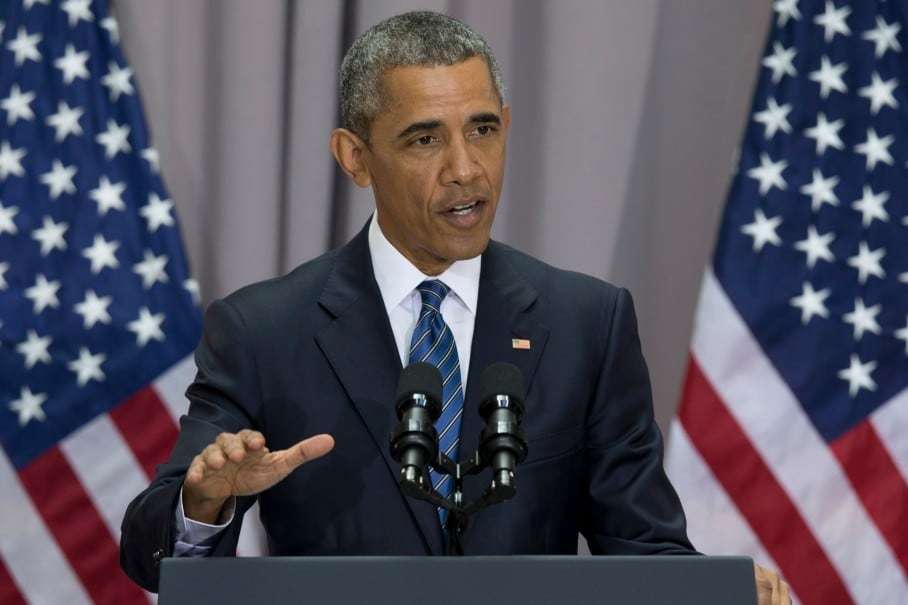The Volokh Conspiracy
Mostly law professors | Sometimes contrarian | Often libertarian | Always independent
Obama administration lawlessness: the top five

The most frequent question I get about my book "Lawless: The Obama Administration's Unprecedented Assault on the Constitution and the Rule of Law" is what I think are the administration's most egregiously lawless actions. So here is my somewhat subjective list.
1. Refusing to comply with the War Powers Act when bombing Libya (and later the Islamic State). The Obama administration made the ridiculous argument, rejected by the lawyers at both the Justice Department's Office of Legal Counsel (an executive branch division that advises the president on legal issues) and the Defense Department, that bombing the heck out of Libya did not constitute "hostilities" under the act, and therefore the act was not implicated. This argument was championed by State Department Legal Adviser Harold Koh, who had argued years earlier that the War Powers Act was implicated when U.S. jets bombed Libya once during the Reagan administration.
2. In early 2009, supporting a voting role in the House of Representatives for Washington, D.C., delegate. The Constitution quite clearly precludes the District of Columbia from having a voting representative in Congress. Many decades of Office of Legal Counsel rulings agreed, as did Obama's own OLC. The administration, led by then-Attorney General Eric Holder, ignored all that, suggesting at the start of the administration that political considerations, no matter how petty, would trump the Constitution and the rule of law.
3. The bailout and bankruptcies of Chrysler and GM. A cornucopia of lawlessness! TARP only provides for bailouts of financial institutions, but the Obama Administration (following the Bush administration) used it for auto companies anyway. Obama appointed a car czar who essentially ran GM for months, with no statutory authority to do so. Under the Constitution, any such czar should have been, but wasn't, subject to Senate confirmation and congressional oversight. The Chrysler bankruptcy was arranged to favor the unsecured union pension funds over secured bondholders, contrary to bankruptcy law. The administration bullied and blackmailed Chrysler bondholders not to object. And so on.
4. Failing to prosecute anyone at the IRS for the 501(c)(4) scandal. That the IRS put its massive bureaucratic thumb on the scales against conservative activist groups is one of the great political scandals in recent U.S. history. When the news first broke, President Obama properly declared that he "will not tolerate this kind of behavior in any agency but especially in the IRS, given the power that it has and the reach that it has into all of our lives." But tolerate it his administration did.
5. Forcing almost every university in the country to eviscerate procedural protections for students accused of sexual assault. This was accomplished by a "Dear Colleague" guidance letter from the Education Department's Office for Civil Rights (OCR). No statutory language, caselaw or binding regulation supports imposing OCR's rules, and they create a serious conflict with standard notions of procedural fairness by severely discouraging cross-examination of complainants and outright banning any evidence, no matter how probative, of the complainant's past sexual behavior with anyone but the accused. Perhaps that's why OCR failed to go through the normal notice-and-comment regulatory process needed for new regulations, instead just announcing them through a letter that is subject to neither normal administrative safeguards nor to judicial review. The Education Department has nevertheless treated its "guidance" as legally binding. More than four years after the letter was released, two Education Department officials recently admitted under oath in congressional hearings that the guidance is not, in fact, legally binding.
Dishonorable mention:
6. Refusing to enforce Obamacare provisions when they were politically inconvenient. This sets a precedent for future presidents to refuse to enforce statutes they find distasteful or politically inconvenient. The dangers can't be overstated.
For interested readers, all of these are discussed in greater detail in the book. Note that this list is based on the degree of lawlessness, not on how "important" the relevant acts were in and of themselves. No. 2, for example, was almost entirely inconsequential policy-wise, but was an action about as disdainful of the law as they come.


Show Comments (0)